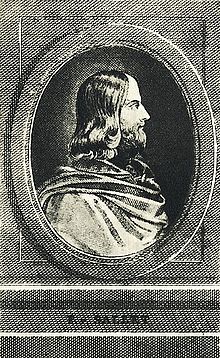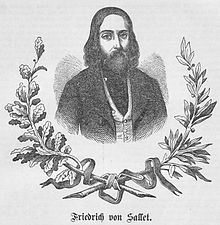Friedrich von Sallet
Friedrich von Sallet (born April 20, 1812 in Neisse ; † February 21, 1843 in Reichau , district of Strehlen ) was a German writer who was best known for his poems that were critical of politics and religion. In numerous satirical works, he also attacked the military of his time.
Life
Friedrich von Sallet was born in 1812 as the son of an engineer captain who died in 1814. Friedrich von Sallet spent his childhood in Breslau , where he soon showed an interest in poetry. In 1824 he entered the cadet corps of Potsdam one, in 1826 in that of Berlin . Friedrich von Sallet was already writing poems and dramas at this time. At the age of only 17, Friedrich von Sallet was sent to Mainz as an officer , a year later he went to Trier , where he became friends with Eduard Duller .
At that time he criticized the military system of the time primarily with satirical essays and poems, for which he was sentenced to two months imprisonment in Jülich in 1832. After the end of his imprisonment, he turned more to writing. Instead of drama, he now limited himself exclusively to writing poetry. In 1835 he went to the war school in Berlin to prepare for a teaching position at a cadet school. In the same year a first collection of his early poems was published.
At the end of 1838 he resigned from the military and turned to Breslau, where he devoted himself exclusively to writing. At this time he was particularly influenced by Georg Wilhelm Friedrich Hegel's philosophy. In his following works, such as the Laity Gospel , which was already in its 9th edition in 1879 as his most successful work, and the atheists and godless of our time , von Sallet deals with Christianity . He portrays man's becoming God as the highest task of Christianity and wanted to establish a new system of morality for this purpose, which the Church-Orthodox circles rejected as "atheistic" or " pantheistic ". As a result, all of his texts were banned from the Prussian school reading books.
In July 1841 Friedrich von Sallet married his cousin Caroline von Burgsdorff in Breslau. The marriage had a child, Alfred von Sallet (1842–1897). Friedrich von Sallet died two years later in Reichau.
Works
- Poems. Richter, Hamburg / Leipzig 1835. ( Digitized 3rd edition 1845 )
- Spark. Troschel, Trier 1838. ( digitized version )
- Nice Irla. A fairy tale. Troschel, Trier 1838.
- The insane bottle. Epic (1838) online - Internet Archive
- Contrasts and paradoxes. Novella. Schulz, Breslau 1838. ([Schön Irla digitalisat of the 1845 edition]) (Reissued ad T. Contrasts and Paradoxes. Werner Wulff Verlag, Ueberlingen o. J. Digitalisat of the 1848 edition ), ( New edition 2017 )
- Laity Gospel (1842) online (1870 edition) - Internet Archive
- Gesammelte Gedichte (1843) online - Internet Archive
- The atheists and wicked of our time. Reclam, Leipzig 1844. ( digitized version )
- Written by Goethe's Faust for women to explain the second part. Schulz, Breslau 1844. ( digitized version )
-
All writings (1845–48)
- Volume 1: Lay Gospel
- Volume 2: Collected Poems
- Volume 3: Contrasts and Paradoxes
- Volume 4: Schön Irla / The Insane Bottle / Sparks / Postponed Poems
- Volume 5: The atheists and godless of our time / Political and literary-aesthetic essays
- Volume 6: Percy's Remnants of Old English Poetry (translation)
Numerous poems by Friedrich von Sallet appeared in magazines during his lifetime, e. B. the North German Spring Almanac and the Chamisso'schen Musenalmanach . He worked as a translator for Percy's Remnants of Old English Poetry , which he translated into German in 1836 together with his brother Carl Jungnitz.
literature
- Sina Farzin: Sallet, Friedrich Karl Ernst Wilhelm von. In: New German Biography (NDB). Volume 22, Duncker & Humblot, Berlin 2005, ISBN 3-428-11203-2 , p. 379 f. ( Digitized version ).
- Rudolf Gottschall : Life and work of Friedrich von Sallet together with communications from the literary estate of the poet . August Schulz Publishing House, Breslau 1844.
- Karl von Goedeke: Germany's poet from 1813-1843 . Hahn'sche Hofbuchhandlung, Hanover 1844, pp. 217–219. ( Digitized version )
- Otto Hundertmark: Friedrich von Sallet. A poet philosopher. Inaugural dissertation . J. Meixner, Würzburg 1916.
- Daniel Jacoby: Sallet, Friedrich von . In: Allgemeine Deutsche Biographie (ADB). Volume 33, Duncker & Humblot, Leipzig 1891, pp. 717-727.
- Wolfgang Menzel: German poetry from the oldest to the most recent. Third volume. Adolph Krabbe, Stuttgart 1859, p. 480 f. ( Digitized version )
- Obituary and review of Gesammelte Gedichte von Friedrich von Sallet (1843). In: Sheets for literary entertainment . Born in 1845, Volume 1, January 23, 1845. Brockhaus, Leipzig, 1845, pp. 90–92. ( Digitized version )
- Theodor Paur: Biographical Foreword. In: Friedrich von Sallet's entire writings. First volume (lay gospel). August Schulz, Breslau 1848, pp. I-viii.
Web links
- Literature by and about Friedrich von Sallet in the catalog of the German National Library
- Works by Friedrich von Sallet in the Gutenberg-DE project
- Friedrich von Sallet in the Internet Archive
Individual evidence
- ↑ Cf. on this Leopold Schefer's well- read Laienbrevier from 1834, on which its title was also based.
- ↑ Collected Poems on Google Books
- ↑ Lay Gospel on Google Books
- ^ Friedrich von Sallet: Contrasts and paradoxes in the Gutenberg-DE project
| personal data | |
|---|---|
| SURNAME | Sallet, Friedrich von |
| BRIEF DESCRIPTION | German writer |
| DATE OF BIRTH | April 20, 1812 |
| PLACE OF BIRTH | Neisse |
| DATE OF DEATH | February 21, 1843 |
| Place of death | Reichau , district of Strehlen |

